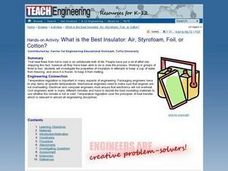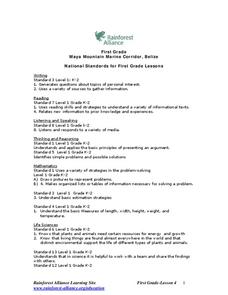Curated OER
Colorado Water, Water Rights and Ditches
Learners do various activities and research on the history of Colorado water rights and local ditches and evaluate current situations in terms of water rights, water sources, ditches,as well as how different groups have been affected by...
Curated OER
Water Pollution
Fifth graders observe and record what happens when household products are added to a tank of water to depict water pollution. They brainstorm ideas of how to clean the contaminate out of the water before watching demonstrations of...
Curated OER
Pollution is Not a Solution
Students explore the environment by completing science worksheets in class. In this water conservation activity, students identify ways water is used in our society and how we abuse the privilege. Students discuss methods to reduce water...
Curated OER
Measuring the Heat Energy of a Chemical Change
Students investigate the Law of Conservation of Energy and the relationship between heat and temperature. In this heat energy and chemical changes lesson, students observe a candle heating a paper cup of water and make predictions about...
Curated OER
Fighting Corrosion to Save an Ancient Greek Bronze
Study corrosion on bronze statues with a hands-on lesson plan. As pupils place a penny in water with salt, they observe the changes in the penny throughout a period of a week. They then analyze the pre-conservation and the...
Curated OER
Treasures in Jeopardy
Learners study how coral reefs can be protected from humans and their activities. In this conservation lesson students explain the benefits of coral reefs and what humans can do to help protect them.
Curated OER
Early Atomic Theory Homework
In this early atomic theory instructional activity, students answer 4 questions about the Law of Definite Proportions, the Law of Conservation of Mass and Dalton's Laws. Students are given 5 statements to determine if each true statement...
Curated OER
Thermodynamics
In this thermodynamics learning exercise, students answer 12 questions about energy, conduction, convection and radiation, heat, the conservation of energy and atoms at different temperatures.
Curated OER
Stream Ecology In Wisconsin and Puerto Rico
Students identify the different types of water and explain in what proportions they exist on Earth. They identify and correctly label the parts of the water cycle and how these parts interact with each other. Students identify the...
Curated OER
I'm Warm Now
Third graders graph how much water is wasted while waiting for it to get warm in the spigot in the sink. In this graphing lesson plan, student first predict how much water is wasted. That night they test it out at home and the next day...
Curated OER
The "Laws" and Principles of Chemical Reactions
In this chemical reaction principles worksheet, students read about definite proportions and the law of conservation of mass. Students read about how to balance a chemical equation. Then students complete 20 fill in the blank, 2 short...
Curated OER
What is the Best Insulator: Air, Styrofoam, Foil, or Cotton?
Students investigate the properties of insulators by attempting to keep a cup of water from freezing, and once it is frozen, to keep it from melting. They conduct the experiment, record and analyze the results, and answer discussion...
Curated OER
Who Takes Care of the Maya Forest Corridor?
First graders study the animals in the Maya Forest Reserve. In this conservation lesson, 1st graders create a graph to compare the environment of animals to their own. They design a 3D model of these two environments.
Curated OER
Where's the Drip?
Students detect water leaks. For this water conservation ecology lesson, students take a tour of the school grounds and identify sources of water and possible leaks. Students report leaks to the custodian and administration.
Curated OER
Tale of a Tuna
Junior marine biologists access the International Commission for the Conservation of Atlantic Tunas' data on Atlantic Bluefin Tuna catches. As they analyze the data, they answer three questions. Background information and links to...
Curated OER
Water-our Precious Resource
Students complete a unit of lessons on water as a limited resource. They conduct Internet research, record information in electronic journals, utilize spreadsheets, conserve water and record the results, and conduct water safety tests on...
Curated OER
Water Conservation
Young scholars explore the need for water conservation. In this water conservation lesson, students use videos for discussion about water conservation and the benefits and drawbacks of different water management techniques. They explore...
Curated OER
Water World
Young scholars explore the various steps of the water cycle. They identify the three steps in the water cycle and how they are related. Students describe three ways to conserve water. Young scholars explore the origin of the water...
Curated OER
Water and Ice
Students explore the states of water. In this water states lesson plan, students observe ice over time and the changes that take place. Students read a related text and draw their observations in a journal entry. Students discuss the...
Curated OER
Soils, Water and Erosion
Students participate in a hands-on experiment to compare how water and soil erosion affect soil and grass. They determine how slope affects erosion and how terracing affects erosion. They write a paragraph summarizing their data.
Cornell University
Chemical Reactions
Investigate the Law of Conservation of Mass through a lab exploration. Individuals combine materials to initiate chemical reactions. They monitor for signs of reactions and measure the masses before and after the reactions for...
Cornell University
Predicting Chemical Reactions
Prove the Law of Conservation of Mass through a lab investigation. A well-designed lesson asks groups to combine materials and monitor indicators for chemical reactions. Measuring the mass of the reactants and products allows individuals...
Curated OER
Corrosion/Conservation/Preservation
Students examine the reasons why metal corrodes in regard to metal artifacts. In groups, they discover the affects of salt water on metal and compare the type of corrosion found on iron. They also research the types of metal...
Serendip
How Do Biological Organisms Use Energy?
When an organism eats, how does food become energy? Young biologists follow glucose through the process of cellular respiration to the creation of ADP using a discussion-based activity. The resource also highlights conservation of mass...
Other popular searches
- Water Conservation
- Water Conservation Activity
- Soil and Water Conservation
- Water Conservation Grade 5 6
- Water Conservation Florida
- Water Conservation Brochure
- Water Conservation Essays
- Water Conservation Programs
- Drought, Water Conservation
- Water Conservation Graphing
- Drought Water Conservation
- Water Cycle Conservation

























